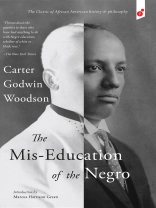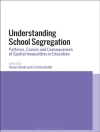“When you control a man’s thinking you do not have to worry about his actions. You do not have to tell him not to stand here or go yonder. He will find his ‘proper place’ and will stay in it. You do not need to send him to the back door. He will go without being told. In fact, if there is no back door, he will cut one for his special benefit. His education makes it necessary.”
Overcoming extreme poverty, racism, and other adversities Carter Godwin Woodson rose through the ranks of U. S. education and academia to discover that the representation of Black History and culture was not taught to students. Furthermore, even within Black academic circles, there was apathy and resistance to setting the historical record straight. With The Mis-Education of the Negro, Woodson strove to challenge the misconceptions and cultural amnesia prevalent in his day.
This controversial book was a call-to-arms for society and the educational system:
“The so-called modern education, with all its defects, however, does others so much more good than it does the Negro, because it has been worked out in conformity to the needs of those who have enslaved and oppressed weaker people.”
He saw a system that distorted the identity of Black American students; a racist curriculum that internalized the humiliation and failures of their ancestors, rather than praising those ancestor’s achievements.
Mis-Education acts as a sharp critique and a pathway towards a new pedagogy that informed Black students about their own history and addressed their unique challenges.
This is the book that launched a thousand afro-centric curricula across institutions and decades, and whose revolutionary message continues to act as a challenge and a warning to the current U. S. educational system.
Tabla de materias
Introduction by Marcus Harrison Green
Foreword
Preface
I. The Seat of the Trouble
II. How We Missed the Mark
III. How We Drifted Away from the Truth
IV. Education Under Outside Control
V. The Failure to Learn to Make a Living
VI. The Educated Negro Leaves the Masses
VII. Dissension and Weakness
VIII. Professional Education Discouraged
IX. Political Education Neglected
X. The Loss of Vision
XI. The Need for Service Rather than Leadership
XII. Hirelings in the Places of Public Servants
XIII. Understand the Negro
XIV. The New Program
XV. Vocational Guidance
XVI. The New Type of Professional Man Required
XVII. Higher Strivings in the Service of the Country
XVIII. The Study of the Negro
Appendix:
Much Ado About a Name
Thre Value of Color
About the Author
About the Introduction Author












